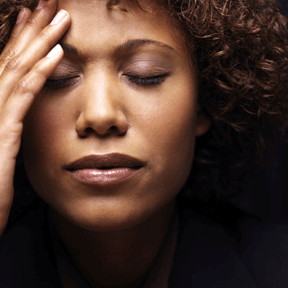 Headaches are a common symptom that affect quality of life in midlife women. Several types that have various causes are possible. Headaches may be provoked by a number of factors, including stress, certain foods or beverages, skipping meals, sleep disturbances or changes in sleep patterns, allergies, exercise, sexual activity, and environmental changes such as noise, bright lights or changes in weather or altitude.
Headaches are a common symptom that affect quality of life in midlife women. Several types that have various causes are possible. Headaches may be provoked by a number of factors, including stress, certain foods or beverages, skipping meals, sleep disturbances or changes in sleep patterns, allergies, exercise, sexual activity, and environmental changes such as noise, bright lights or changes in weather or altitude.
Migraines are moderate to severe headaches that involve throbbing or pulsating pain that’s usually aggravated by activity. They’re typically accompanied by sound sensitivity, light sensitivity, or nausea. Hormones may play a role in migraine headaches. Some women may notice that headaches tend to occur at certain times in their menstrual cycle. The fluctuation in estrogen levels in perimenopause may cause hormone headaches to increase. But many women will see these headaches stop once menopause is reached; however, some women will continue to have headaches after menopause.
Tension-type headaches are the most common headache in the general population and are caused by stress and muscle tension. They tend to be mild to moderate, are more steady pressure rather than throbbing, and typically are not linked to sound or light sensitivity or nausea. Unlike migraine, they’re not believed to be hormone related. Most women report that these headaches remain stable or mildly worsen with menopause.
Most headaches will resolve on their own with lifestyle measures or when treated with nonprescription pain relievers. Combining a pain reliever with caffeine may help treat a migraine attack; however, caffeine also may be a migraine trigger for some women. Tension-type headaches also may be relieved with techniques such as stress management, relaxation therapy, and physical therapy.
Some headaches can be a sign of a serious underlying condition and should be evaluated promptly. Any of these symptoms should be reported to a healthcare provider:
- Occurrence of a “first or worst” headache
- Progressively worsening headache
- Sudden or abrupt headache onset
- Headache that wakes you up from sleep
- Headache that occurs with a high fever or rash
- Confusion, dizziness, or weakness with a headache
- Headache that accompanies unexplained weight loss
- Headache that differs from all previous headaches
More severe headaches, especially those experienced frequently, may require prescription medications to treat. For women who experience headaches more than 2 days a week, a preventive medication can help to reduce headache frequency. Seek the advice of a healthcare provider if headaches are bothersome and recurrent.
Photo credit: Copyright © Microsoft. Used with permission.